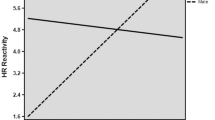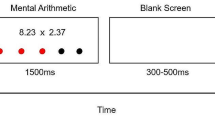Abstract
The present study compared ambulatory blood pressure in male and female subjects preselected for high and low hostility levels and investigated interpersonal daily stress as a possible mediational mechanism. Ambulatory blood pressure and heart rate were measured in 48 male and female students previously classified as high or low on the Cook-Medley Hostility (Ho) Scale. Subjects wore an ambulatory monitor for a working day and also completed measures of perceived social support, daily interpersonal stress, and health behavior information. Results indicated that subjects scoring high on the Ho scale had higher mean levels of ambulatory systolic blood pressure than low Ho subjects, even when controlling for traditional risk factors, such as cigarette smoking. High Ho subjects also reported greater daily interpersonal stress and less social support than low Ho subjects. Perceived interpersonal stress partially accounted for the relationship between hostility and blood pressure. Subjects high in hostility showed greater mean ambulatory systolic blood pressure levels. Consistent with the transactional model of hostility and health, the relationship between hostility and blood pressure appears to be partially accounted for by the daily experience of interpersonal stress.
Similar content being viewed by others
REFERENCES
Barefoot, J. C., Dahlstrom, W. G., and Williams, R. B. (1983). Hostility, CDH incidence, and total mortality: A 25-year follow-up study of 255 physicians. Psychosom. Med. 45: 59–63.
Barefoot, J. C., Dodge, K. A., Peterson, B. L., and Williams, R. B. (1989). The Cook-Medley hostility scale: Item content and ability to predict survival. Psychosom. Med. 51: 46–57.
Brantley, P. J., Waggoner, C. D., Jones, G. N., and Rappaport, N. B. (1987). A daily stress inventory: Development, reliability, and validity. J. Behav. Med. 10: 61–74.
Christensen, A. J., and Smith, T. W. (1993). Cynical hostility, self-disclosure and cardiovascular reactivity. Psychosom. Med. 55: 193–202.
Cohen, S., and Hoberman, H. M. (1983). Positive events and social supports as buffers of life stress change. J. Appl. Soc. Psychol. 13: 99–125.
Conway, J., and Coats, A. (1989). Value of ambulatory blood pressure monitoring in clinical pharmacology. J. Hypertens. 7(Suppl. 3): S29–S32.
Cook, W. W., and Medley, D. M. (1954). Proposed hostility and pharisaic-virtue scales for the MMPI. J. Appl. Soc. Psychol. 13: 99–125.
Devereux, R. B., Pickering, T. G., Harshfield, G. A., Kleinert, H. D., Denby, L., Clark, L., Pregibon, D., Jason, M., Kleiner, B., Borer, J. S., and Laragh, J. H. (1983). Left ventricular hypertrophy in patients with hypertension: Importance of blood pressure response to regularly recurring stress. Circulation 68: 470–476.
Hardy, J. D., and Smith, T. W. (1988). Cynical hostility and vulnerability to disease: Social support, life stress, and physiological response to conflict. Health Psychol. 7: 447–459.
Houston, B. K., and Kelley, K. E. (1989). Hostility in employed women: Relation to work, and marital experiences, social support, stress and anger expression. Pers. Soc. Psychol. Bull. 15: 175–182.
Jamner, L. D., Shapiro, D., Goldstein, I. B., and Hug, R. (1991). Ambulatory blood pressure and heart rate in paramedics: Effects of cynical hostility and defensiveness. Psychosom. Med. 53: 393–406.
Kuskenvuo, M., Kapiro, J., Rose, R. J., Kesnaiemi, A., Sarnaa, S., Heikkila, K., and Langinvanio, H. (1988). Hostility as a risk factor for mortality and ischemic heart disease in men. Psychosom. Med. 50: 330–340.
Lepore, S. J. (1995). Cynicism, social support, and cardiovascular reactivity. Health Psychol. 14: 210–216.
Linden, W., Chambers, L., Maurice, J., and Lenz, J. W. (1993). Sex differences in social support, self-deception, hostility, and ambulatory cardiovascular activity. Health Psychol. 12: 376–380.
Matthews, K. A. (1988). Coronary heart disease and type A behaviors: Update on and alternative to the Booth-Kewley and Friedman (1987) quantitative review. Psychol. Bull. 104: 373–380.
McCranie, E. W., Watkins, L. O., Brandsma, J. M., and Sisson, B. D. (1986). Hostility, coronary heart disease (CHD) incidence and total mortality: Lack of association in a 25-year follow-up study of 478 physicians. J. Behav. Med. 9: 119–125.
Perloff, D., Sokolow, M., and Cowan, R. (1983). The prognostic value of ambulatory blood pressures. JAMA 249: 2792–2798.
Perloff, D., Sokolow, M., Cowan, R. M., and Juster, R. P. (1989). Prognostic value of ambulatory blood pressure measurements: Further analyses. J. Hypertens. 7: S3–S10.
Pickering, T. G. (1993). Applications of ambulatory blood pressure monitoring in behavioral medicine. Ann. Behav. Med. 15: 26–32.
Pope, M. K., Smith, T. W., and Rhodewalt, F. (1990). Cognitive, behavioral, and affective correlates of the Cook and Medley hostility scale. J. Pers. Assess. 54: 501–514.
Sallis, J. F., Johnson, C. C., Trevorrow, T. R., Kaplan, R. M., and Melbourne, F. H. (1987). The relationship between cynical hostility and blood pressure reactivity. J. Psychosom. Res. 31: 111–116.
Schneiderman, N., and McCabe, P. M. (1989). Psychophysiologic strategies in laboratory research. In Schneiderman, N., Weiss, S. M., and Kaufmann, P. G. (eds.), Handbook of Research Methods in Cardiovascular Behavioral Medicine, Plenum, New York, pp. 349–364.
Shekelle, R. B., Gale, M., Ostfeld, A. M., and Paul, O. (1983). Hostility, risk of coronary heart disease and mortality. Psychosom. Med. 45: 109–114.
Smith, T. W. (1992). Hostility and health: Current status of a psychosomatic hypothesis. Health Psychol. 11: 139–150.
Smith, T. W., and Allred, K. D. (1989). Blood-pressure responses during social interactions in high-and low-cynically hostile males. J. Behav. Med. 12: 135–143.
Smith, T. W., and Brown, P. C. (1991). Cynical hostility, attempts to exert social control, and cardiovascular reactivity in married couples. J. Behav. Med. 14: 135–143.
Smith, T. W., and Christensen, A. J. (1992). Cardiovascular reactivity and interpersonal relations: Psychosomatic processes in social context. J. Soc. Clin. Psychol. 11: 279–301.
Smith, T. W., and Frohm, K. D. (1985). What's so unhealthy about hostility? Construct validity and psychosocial correlates of the Cook and Medley Ho Scale. Health Psychol. 4: 503–520.
Smith, T. W., and Houston, B. K. (1987). Hostility, anger, expression, cardiovascular responsivity, and social support. Bio. Psychol. 24: 39–48.
Smith, T. W., and Pope, M. K. (1990). Cynical hostility as a health risk: Current status and future directions. J. Soc. Behav. Pers. 5: 77–88.
Smith, T. W., Pope, M. K., Sanders, J. D., Allred, K. D., and O'Keeffe, J. L. (1988). Cynical hostility at home and work: Psychosocial vulnerability across domains. J. Res. Pers. 22: 525–548.
Suarez, E. C., and Williams, R. B. (1989). Situational determinants of cardiovascular and emotional reactivity in high and low hostile men. Psychom. Med. 51: 404–418.
Suls, J., and Martin, R. (1993). Daily recording and ambulatory monitoring methodologies in behavioral medicine. Ann. Behav. Med. 15: 3–7.
Turner, J. R., Ward, M. M., Gellman, M. D., Johnston, D. W., Light, K. C., and von Doornen, L. J. P. (1994). The relationship between laboratory and ambulatory cardiovascular activity: Current evidence and future directions. Ann. Behav. Med. 16: 12–23.
Ward, M. M., Turner, J. R., and Johnston, D. W. (1994). Temporal stability of ambulatory cardiovascular monitoring. Ann. Behav. Med. 16: 3–11.
Williams, R. B., Barefoot, J. C., and Shekelle, R. B. (1985). The health consequences of hostility. In Chesney, M. A., and Rosenman, R. H. (eds.), Anger and Hostility in Cardiovascular and Behavioral Disorders, Hemisphere, Washington, DC, pp. 173–185.
Author information
Authors and Affiliations
Rights and permissions
About this article
Cite this article
Benotsch, E.G., Christensen, A.J. & McKelvey, L. Hostility, Social Support, and Ambulatory Cardiovascular Activity. J Behav Med 20, 163–176 (1997). https://doi.org/10.1023/A:1025530711432
Issue Date:
DOI: https://doi.org/10.1023/A:1025530711432




